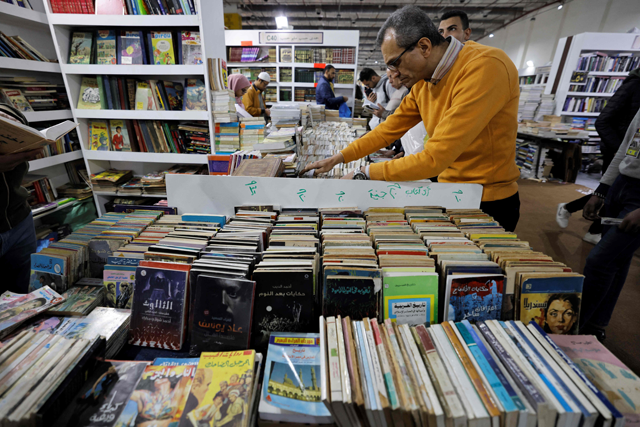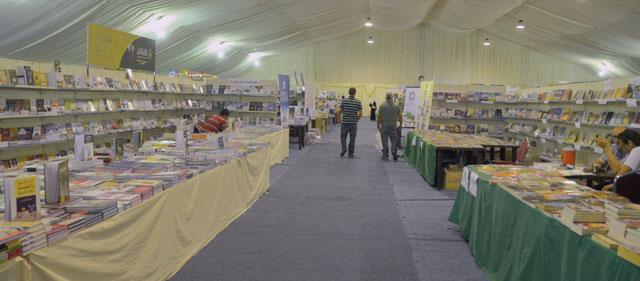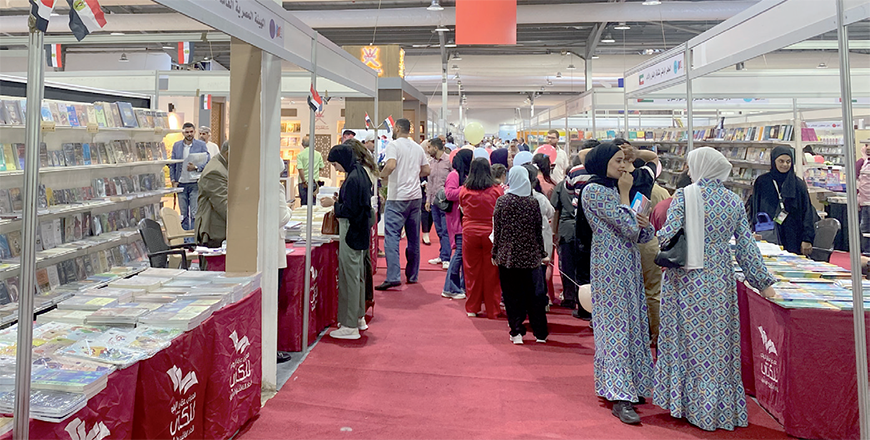You are here
Egyptians hope to bag bargains at book fair as crisis bites
By AFP - Feb 04,2023 - Last updated at Feb 04,2023

In this photo taken on January 29, people visit the 54th Cairo International Book Fair in Cairo (AFP photo)
CAIRO — Thousands of Egyptian bibliophiles weave through a labyrinthine display of books, reviving an annual tradition at the Arab world’s largest book fair, but this year it comes at a steep cost.
The 54th Cairo International Book Fair was overshadowed by a punishing economic crisis that has seen Egypt’s currency, the pound, halve in value and prices skyrocket in the past year.
Organisers say the fair lured more than half a million visitors on its opening weekend alone — but with publishing houses already struggling to cover the rising cost of printing, many fear this will not translate to sales.
“We expected a much smaller turnout this year than we had,” said Wael Al Mulla, one of more than 800 publishers at the fair.
Budgets are tight in Egypt, where inflation hit 21.9 per cent in December, forcing many to dip into their savings to cover ever-rising daily costs.
“Books are a luxury product,” said Mulla, who heads the Masr El Arabia publishing house. “They’ll inevitably be less of a priority when people need to budget for the basics.”
A steep currency devaluation has compounded costs for import-dependent publishers, leading many to hike the price of books by up to double.
“You could once come with 2,000 pounds [now $66] and fill a suitcase with books,” Mohamed El Masry, chief executive of El Rasm Bel Kalemat Publishing, told AFP.
“You can’t do that any more,” the 38-year-old lamented.
‘Bare minimum’
To incentivise readers, Egypt’s publishers’ association has encouraged sellers to give the option of buying books in instalments through popular buy-now-pay-later services.
State-owned publishers have also offered heavily discounted Arabic classics for under 30 pounds, or $1.
According to sellers, readers — eager for their annual haul despite the crisis — are deploying new methods to lessen the burden.
“We see most people coming with their friends as a group. They’ll decide what they want, divide the books among themselves and then pass them around,” said Abdallah Sakr, 33, a publishing manager at El Mahrousa.
“Everyone’s surprised when they see the prices, but there’s still a desire to read. So instead of buying five books they’ll get two, or one instead of two,” he added.
To survive the crisis, publishing houses have grown more selective.
As the pound plummeted, the price of basic paper stock — all imported — quadrupled, forcing publishers to “decrease commissions and print fewer books per edition”, Mulla said.
“I have to be very careful with my choice of books, only picking the titles I’m really sure will be popular.”
Egypt’s robust publishing industry — historically a key exporter of Arabic literature, to which readers would flock for the region’s cheapest volumes — has already shown signs of trouble.
“Some publishing houses have had to downsize to the bare minimum, or halt activities until the economic landscape is a little clearer,” Mulla said, noting some had already had to shut down their presses permanently.
Second-hand lifeline
In a corner of the fair, vendors from the city’s well-known Azbakeya second-hand book market appeared unfazed by the economic downturn.
Nestled against the walls of the historic Azbakeya Garden, the stalls have for over a century sold used books, as well as pirated prints, for a fraction of the prices elsewhere.
As in past years, the booksellers have carted their innumerable volumes from the bustling market in central Cairo to the polished new exhibition centre on the city’s outskirts.
Like hundreds of thousands of loyal readers, 39-year-old Mohamed Shahin “made a beeline” for the Azbakeya booksellers with his family in tow, he told AFP.
“This is the most popular place at the fair, even though the good books sell out quick because there aren’t a lot of copies,” 18-year-old engineering student and volunteer Malak Farid said.
Mohamed Attia, an imam in his 40s, travels to Cairo for the fair every year from his hometown of Dakahlia, some 150 kilometres north of the capital.
With most volumes going for less than one dollar, the Azbakeya market has long been a treasure for Attia, and now it has become a necessity.
“Books are so much more expensive this year,” he told AFP.
But, he added with relief, “prices in Azbakeya have remained the same” — a rare boon in today’s economic climate.
Related Articles
CAIRO — The annual Cairo International Book Fair opened this week in a shiny new venue far away, literally and metaphorically, from the city
The lack of proper promotion of this year’s Amman International Book Fair, in addition to financial difficulties facing consumers, have reduced the demand on books, booksellers said on Wednesday.
AMMAN — Deputising for His Majesty King Abdullah, Culture Minister Haifa Najjar on Thursday inaugurated the 22nd Amman International Book Fa
















